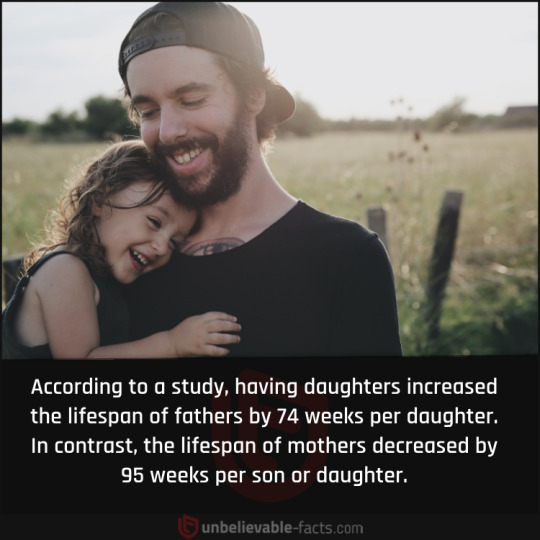#lifespan
Text
Humans are weird: lifespan
Clara had known the mission was a bad idea. That guess was reinforced when the ship crashed. The other members of her little crew had died on impact, but she’d only been injured. From her guess it was just a few broken or otherwise messed up bones- annoying, yes, but not irreparable. She’d tried communicating with her crew, sending out transmissions and mentally screaming for Indigo, but nothing came to her rescue.
By some miracle, the air was breathable. The climate was on the warmer side, reminding her of the Caribbeans. It was quite nice, and if it weren’t for the three moons, binary star system, and the lavender sky, she would’ve been able to believe this was in a familiar system.
She stumbled out of the ship, swearing to herself when she saw what a wreck it was; there was no way she’d be getting back into the air with that.
Instead, she looked around. It appeared that she’d landed in a field of sorts- on the horizon she saw what appeared to be a civilization, maybe a town, and around her were tall trees that had pear-like fruits on them. A quick scan said they were edible, so she grabbed one. It was perfectly at her shoulder level, which she appreciated. The fruit was tasty, reminding her of earth’s apples or the kalrin-fruits Indigo had introduced to her.
It took a few minutes, but soon Clara had made herself a splint for her broken arm and gathered what she could from the ship’s remains.
She was about to make her way towards the town when she heard a strange chittering noise behind her. The translator didn’t pick it up, which either meant this was an undiscovered language or it was broken- it was really a 50/50 chance. Turning around, she saw a small creature, maybe reaching up to her knees, chittering at her. It seemed to be a bit scared, but still interested. It gestured for her to follow it, which she did, being led to another small town. All around her were the little creatures, rushing about, some coming up to her. They were cute, in a way, with mint-green skin, four arms, fur down their backs, six large eyes- well, she assumed they were eyes- and a bipedal walking pattern. They led her to a building with what appeared to be a collapsed roof, which only reached up to her head. Easily enough she fixed it, and the creatures seemed happy, surrounding her and making those same chittering noises, much more happy-sounding this time.
The Chiri, as Clara called them, were a fascinating civilization. They had a complex language of clicks, chirps, and assorted chittering sounds that took Clara a while to learn properly. Their planet was far faster than earth, one of earth’s weeks was the equivalent of a month for them, and an earth month was the equivalent of a year. Most Chiri only lived for a few of their years, but their lives were filled with celebration. It felt like every week Clara got invited to a new celebration- either a wedding, a coming of age, a new harvest, or even a funeral. Even though Clara took only around six months to fully recover, by that point she had become known as a Chiri guardian. She’d been on the planet for a number of their years, becoming a guardian figure. Where her ship had crashed was turned into a shrine of sorts, new towns being built around it. In exchange, Clara protected them, guided them, and shared her knowledge with them. She’d even learned their language to the point where it was as fluent as any other, even without her translator, which she was fairly certain had broken.
The Chiri had given Clara a new name that they called her, Xi-Rai’du. Most of the children knew her as Xixi.
Clara trusted her friends, they’d taken her in and healed her. They felt like family just as much as her crew on the ship did. Despite their short lives, the Chiri were a people who valued learning. They passed down stories from generation to generation, and Clara would help to remember them as well. She taught them to write, transcribing their stories.
One of the young rushed towards Clara, a little girl who had only recently become old enough to talk.
“Xixi! Xixi! There you are!” The little one, her name Si’ra, reached out her four arms for Clara to lift her up, making a high-pitched noise that was roughly the same as a laugh. “The celebration was about to start without you, come! Dari and Lixai want you there!”
Clara nodded, smiling. Dari and Lixai were getting married, and Clara didn’t want to miss out. Still carrying Si’ra, Clara made her way towards the town.
All around the town were banners decorated in vibrant colors, flowers in every windowsill and a clear trail of petals leading to where the wedding would take place. Clara had always loved the Chiri’s celebrations, they were all filled with laugher, music, dancing and festivities that could go for days. As soon as Clara showed up, she was surrounded by lively music, cheers from the Chiri who’d arrived for the celebration, and the greeting of Dari and Lixai, both wearing gorgeous formal attire. Clara bowed to them, smiling as she let Si’ra down, watching her rush towards the other children to join in there game.
“Lady Xi-Rai’du, welcome.” Lixai spoke first, joy clear in all six of her eyes.
Clara shook her head, “Today isn’t a day for celebrating me, it’s for you two.” She gestured to the crowd, “They’re all here for you- so go, celebrate! You’ve earned it.”
Lixai and Dari smiled, taking Clara’s hand and leading her into the crowd.
The wedding was a joyous one, and Clara couldn’t help but feel incredibly proud of Lixai and Dari. Weddings were a major event for both humans and chiri, although the chiri certainly had a more lively celebration all the way through.
The next day, Clara went to the cave where the Chiri kept murals of all their major events. She smiled as she looked, seeing paintings of herself defending the town from wild beasts, celebrating amongst them, and even when she’d first arrived, now over a year ago.
Deep down though, she knew couldn’t stay. Her crew still needed her, and she knew the Chiri had to grow into a full civilization on their own. She was torn out of her mind though when she heard what sounded like screams outside. Sa’ri rushed in, panicked. “Xixi! Help! There are- there’s something outside!”
Clara, admittedly, panicked. She picked Sa’ri up again, letting the girl lead her out. As soon as she left she saw the cause of the panic. In the sky above was a ship. Her ship.
As soon as it landed, Clara put herself between the ship and the Chiri. She faced the panicked crowd, trying to keep order.
“All of you! Please, calm down. These newcomers mean no harm.”
The Chiri trusted her, more or less calming down. Clara sighed in relief, facing the ship as the bridge lowered. What she saw surprised her- another human.
It took a moment for Clara to realize they were speaking English- she’d become so used to hearing the chiri’s language of chirps and squeaks- but when she registered what they were saying she almost laughed. It was a declaration of peace, saying they were only doing a recovery mission. Apparently they’d finally gotten the distress signal Clara had sent when she first was crashing, tracing it back to her.
Clara approached the ship, Sa’ri in her arms, and faced the stranger.
“If you’re looking for the recon group that was sent out here a little over a year ago..” she sighed, “I’m all that’s left. I’ve been living on this planet for the past year, and the civilization you see have helped me. They nursed me back to health, gave me a place to stay, and trusted me.” Behind her were the people who she’d protected for what were generations to them. “My name is Clara.. but it is also Xi-Rai’du, and these are the chiri.”
The human seemed shocked, but they didn’t do anything agressive.
“The crew thought you’d died..” they muttered, “they hired me as a replacement. How are you even alive?!”
She couldn’t help but laugh, “I told you. The chiri took me in, and the planet’s atmosphere is breathable.” she put Sa’ri down, and she hugged my leg before running back to her family, as though sensing that this would be the last time she saw her. “I assume you’re here to bring me back now that you know I’m alive?”
They nodded, gesturing for Clara to follow them.
“Just give me a second,” Clara turned to face the Chiri, bowing to them and switching back to their language. “Thank you, all of you. Now I must leave.. but I will return. Reach for the stars, and perhaps we will meet in the cosmos one day.”
The chiri seemed to understand, solemnly accepting that their guardian was leaving.
“Xixi!” Sa’ri called up from the crowd, “I’ll find you again, I promise!”
She turned, nodding to the fellow human. “Bring me back onto the ship.”
Maybe, just maybe, part of the reason she’d turned was because she wanted to hide the tears forming in the corners of her eyes. But when she returned onto the ship, Clara was reminded of where she belonged, amongst her family in the stars. The chiri had been kind, but she had to go. Besides, when Indigo saw her again, xir expression just about made all of the time away worth it.
#whoo boy#this went in every direction except for the one I thought it would go in#emotional? Maybe?#humans are weird#humans are space orcs#earth is space australia#lifespan#sci fi
3K notes
·
View notes
Text
There's a marked difference between how quickly mammals (including ourselves) age and how quickly many species of reptiles and amphibians do.
This discrepancy, one scientist proposes, could be due to the dominance of dinosaurs millions of years ago, during a critical period of mammalian history.
Microbiologist João Pedro de Magalhães from the University of Birmingham in the UK describes his "longevity bottleneck" hypothesis in a newly published paper.
Here's the thinking: when dinosaurs ruled Earth, it was necessary for the much smaller mammals to be able to reproduce quickly in order to survive, which means the genes for longer lifespans may have been discarded as evolution progressed.
"Some of the earliest mammals were forced to live towards the bottom of the food chain, and have likely spent 100 million years during the age of the dinosaurs evolving to survive through rapid reproduction," says de Magalhães.
"That long period of evolutionary pressure has, I propose, an impact on the way that we humans age."
Continue Reading.
176 notes
·
View notes
Text
Alternative SpongeBob universe where the SpongeBob characters have their biologically accurate lifespans, but this doesn’t take away from the sweet and goofy nature of the show.

SpongeBob is like 400 years old and every 100 years he switches careers. I like to think he built every room in the pineapple and filled it with his inventions, and collected a metric ton of books for the library where he does research only a really long living creature could, and made that workout room but even after all these years he just doesn’t have the muscle - not that that’s gonna stop him from trying.
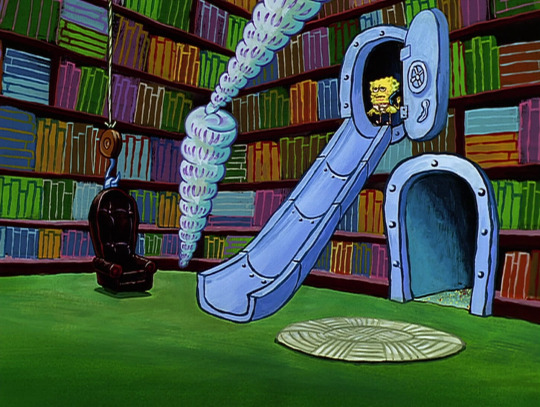
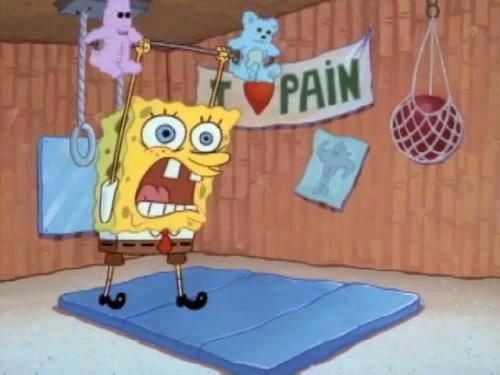
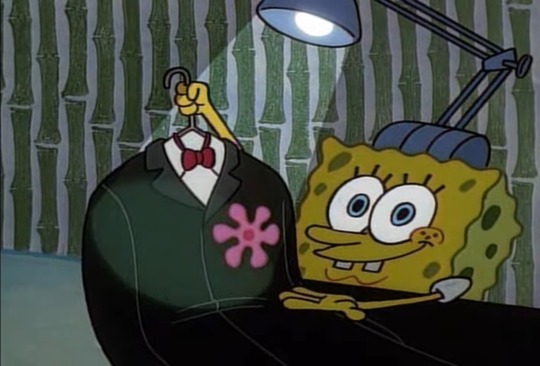
In fact he’s relatively good at karate despite his weakness, probably from years of training and he still calls it kah-rah-tay, cause he’s silly like that.
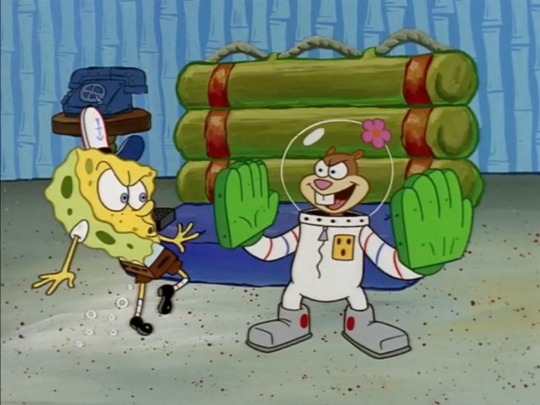

Same with boating school, like centuries in and he still can’t drive, it’s priceless. He still can’t tie his shoes without listening to that loop de loop and pull song. And it’s endearing too because he keeps giving it a go regardless. He keeps making friends and trying to be cool and working and jellyfishing, etc.
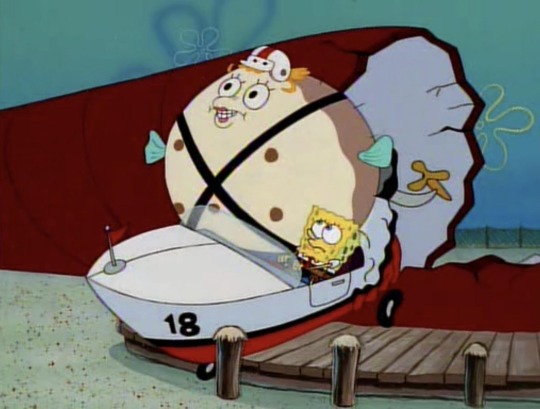
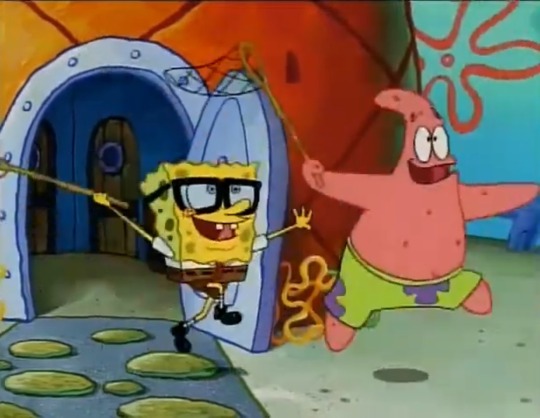
Working in the fast food industry sucks to everyone except SpongeBob, because living simply with his pet snail and neighbours and working behind the grill for the town is just as pleasant if not better than every other miscellaneous job he’s done up to this point.
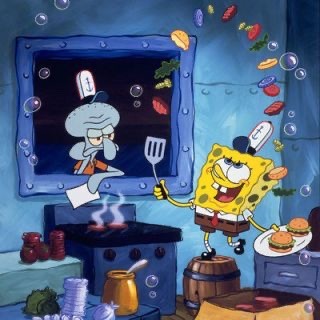
None of his friends mind that he’s got a massive lifespan compared to them, cause aside from the time being the same, I feel like it would just be as notable as him having five fingers. Like living in the ocean amongst so many different species just makes the lifespan differences common knowledge.
You’d think that SpongeBob eventually outliving his friends is a pretty depressing idea, and I’d see what you mean, I grew up with all those sad theory and fact videos about cartoon characters haha. But, genuinely, in my mind this universe would go the same way, and SpongeBob would cherish his friends, rain or shine, 2 years later or 200 years later. He has the chance to be a god in Atlantis in Neptunes Spatula, but of course he’s not going without Patrick and all his other friends, no way.
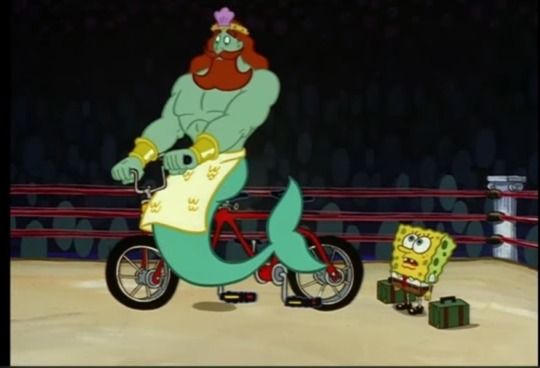
I am very normal. 💚
#spongebob#spongebob squarepants#text post#SpongeBob au#death mention#technically#lifespan#one of those outliving friends theories#but nicer!#ask to tag#spunch bob#this idea was partially inspired from Stephen Hillenburg’s SpongeBob art bible#where he writes about spongebobs characterisation as always determined despite#in spite of#and because of his flaws#this idea is strangely meaningful to me yeah#autism posting
258 notes
·
View notes
Text
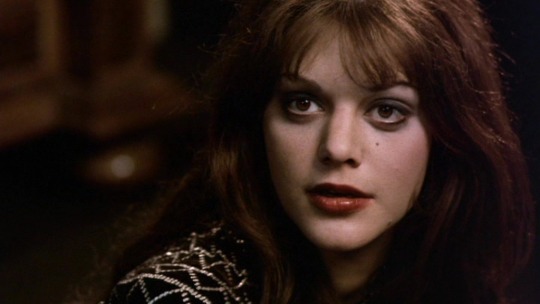


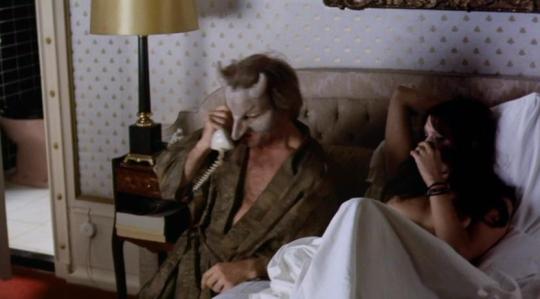

Tina Aumont
🎥 Lifespan (1976)
21 notes
·
View notes
Text
i think Baguette is dying/dead.
i noticed her slumped over in her tube last night, and she hasnt moved since; same spot, same pose.
it makes sense, given how old she must be. ive had her since early october, and she was already an adult then, so id estimate she's no less than a year old. its definitely been a long life.
im going to leave her be to fade peacefully, if she hasnt already. if she still hasnt moved by the time i wake up tomorrow afternoon, I'll pick her up and check for sure.
i cant help but cry right now, because I'll miss her so much, but im so glad shes going peacefully. id just posted a pic earlier yesterday of her goofing around, so i dont think she's suffered.
11 notes
·
View notes
Text
One cool thing about Zato-1 is that his forbidden beast Eddie had an artificial cost attached to him.
The creator of the spell, who is unnamed, made it so that the cost of summoning Eddie would be the caster’s eyes and life span.
Of course, these can be circumvented, as we see with Zato’s resurrection, solving the life issue.
The whole eye stuff is unsolved tho. Probably for character design reasons. Lore wise, Faust could fix it in about five minutes.
Now that I think about it, a lot of Zato’s problems were cured by Faust.
#guilty gear#guilty gear strive#ggst#character design#zato 1#ggst faust#faust guilty gear#faust#eyes#lifespan#curing death itself#funky little shadow beast#making spells
37 notes
·
View notes
Text
The lifespan of demigods and heroes
I'm still painstakingly building a precise chronology of the Second Trojan War, taking detours along the biographies and lineages that immediately precede it. I've been thinking for a while about chronological discrepancies between dynasties and how to reconcile them. As an extreme example, if we compare the Inachids of Argos/Mycenae with the Deucalionids of Thessaly, some of these discrepancies can represent gaps of ten generations.
But I realize I've been assuming all along that the lifespan of the characters involved was that of mortal men. These families descend from gods and naiads and I'm wondering whether allowing some of their members to have lived three or four human lifetimes would be the easiest and most elegant way to close these gaps.
I'll have to research what the sources have to say about that. In most cases, they just refer to characters as "young" or "old". Nestor and Tiresias are expicitly given long lives by the gods, but I do not recall them being qualified as exceptions and there is no reason to believe that there weren't other occurences of such favors.
Giving the Deucalionids, descendants of Prometheus, extra long lifespans would solve many, if not most, of my chronological issues. I'll have to give some thought to the nature of mortality versus immortality, and how that could affect the child of a god and a mortal. [note to self : myths of Achilles, Demophon, Prometheus & Chiron, men of the golden, silver and bronze ages]
I'd be curious to hear your take on this topic. Please don't hesitate to comment!
#ancient greece#classical mythology#greek gods#greek heroes#greek mythology#mythology#trojan war#chronology#longevity#lifespan#nestor#tiresias#inachids#deucalionids
13 notes
·
View notes
Text
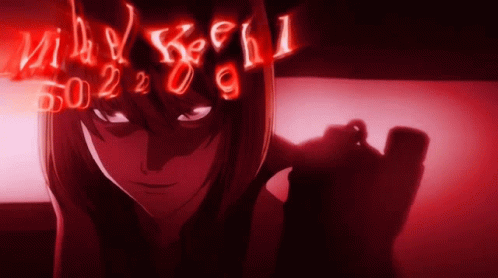
16 notes
·
View notes
Note
Hii, hello! I am just here to ask how much time has canonically passed between chapter 1 and 8. I am trying to complete the soh templare but I have no idea how old my shepherd is lol. The most I've found in this blog is that mc is slightly older than Prihine, who was 20 in chapter 1😅
Also, another quick question (idk if it was already answered, in that case feel free to ignore it) does an elfheritage!mc/hunterheritage!mc have the same lifespan of a norm mc or do they partially retain some of their heritages' percks/downgrades in that regard?
Hi, I'm pretty sure Chapter 1 takes place in Zellea (the prologue happened in Kthili) and the beginning of Chapter 9 coincides with the start of Camoa. So it's almost been a year, but not quite. Hope that makes sense!
Your second question is in the FAQ! :)
37 notes
·
View notes
Text
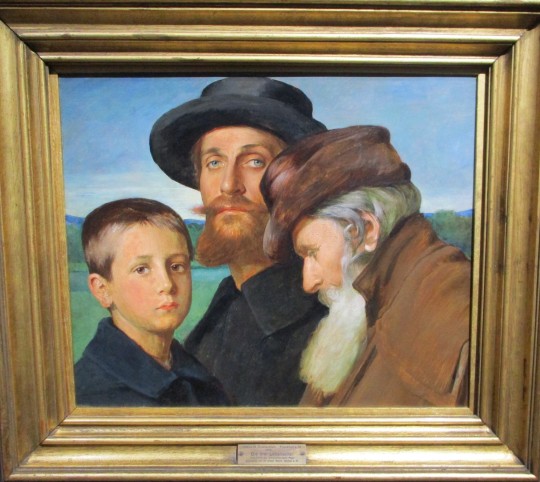
The Three Ages, 1900, Tempera on cardboard, by Ottilie W. Roederstein
from the 2022 exhibit Self. Determined. - The Painter Ottilie W. Roederstein at the Städel Museum in Frankfurt, Germany
13 notes
·
View notes
Text
Since I was 8 I wanted to die on my 27th birthday. Enough time to live and accomplish everything, but not long enough to see everyone I love die. I recently read that the lifespan of BPD is 27 and idk about you but it feels like a sign.
#borderline personality disorder#actually bpd#bpd vent#bpd thoughts#bpd problems#what#27th birthday#lifespan
13 notes
·
View notes
Text
Aging might have advantages in wisdom, experience, and even evolution, but the gradual breakdown of biology that comes with growing old is rarely much fun for anybody.
A new study in mice suggests it may not always have to be this way.
Continue Reading.
76 notes
·
View notes
Text
https://nationalpost.com/opinion/barbara-kay-heres-what-happens-when-the-gender-gap-index-is-adjusted-for-bias
By: Barabara Kay
Published: Jan 8, 2019
The apparently neutral phrase, “gender inequality,” is not neutrally understood in our society. It normally conjures up women’s lower numbers in male-dominated corporate directorships and STEM professorships or other high-status domains that are in fact accessible only to a sliver of the male population, never mind the narrower female sliver.
Social scientists allegedly strive for a much more holistic picture, especially when setting nations beside each other for a global assessment of gender inequality. One frequently cited authority is the Global Gender Gap Index (GGGI), introduced in 2006, and relied on by policy makers worldwide. But a provocative new study, released Jan. 3, takes critical distance from GGGI premises, providing its own set of metrics for analyzing gender inequalities and arriving at some startlingly disparate conclusions.
Entitled “A Simplified Approach to Measuring National Gender Inequality,” authors Gijsbert Stoet from the U.K.’s University of Essex, and David C. Geary from the University of Missouri, contend that the GGGI is unreliable, because it is “biased to highlight women’s issues.” They argue that the GGGI does not measure men’s areas of disadvantage, such as compulsory military service, harsher punishments for the same crime, and workplace deaths — 95 per cent male.
By definition, they say, the GGGI “excludes the possibility that men can be less well off than women – this is because the GGGI focuses on women’s advancement.” As well, they contend that the GGGI uses indicators that are only relevant to elite women, and that the GGGI includes indicators more reflective of choice than of discrimination.
The researchers propose a truly gender-neutral set of metrics for calculating equality scores, named the Basic Index of Gender Inequality (BIGI). BIGI focuses on three factors: educational opportunities (literacy, years of primary and secondary education), healthy life expectancy (years expected to live in good health), and overall life satisfaction which, taken together, are the “minimum ingredients of a good life.”
These metrics can be applied anywhere, regardless of income level, cultural paradigm or national economic development tier. In the words of the study abstract, because of its focus on issues that are important to all men and women in any nation, BIGI “better captures variation in gender inequality than other measures, with inclusion of outcomes that can be favourable or unfavourable to either sex, not simply unfavourable to women.”
Stoet and Geary calculated BIGI scores over five years (2012 through 2016) for 134 nations, representing 6.8 billion people. They relied on GGGI reports published by the World Economic Forum and the Gallup World Poll for data. To their surprise, they found that using the BIGI as a yardstick, men are on average disadvantaged in 91 countries, while women are disadvantaged in 43 countries, most of them economically under-developed. Sometimes the deviations from parity are quite small or even negligible, as for example in the case of Israel, Saudi Arabia, Singapore, Turkey, China and Switzerland.
Saudi Arabia? Parity? Yes. Because equality between the sexes does not mean men and women are doing equally well, on average, “just that they are more or less equal within their life circumstances.” While women in countries with a poor reputation for gender equality may fall behind men in one area, men may fall behind in another area, cancelling out both scores.
Saudi Arabia is a highly developed nation in which women fall behind in education, but score higher on healthy life expectancy and life satisfaction. This may seem counterintuitive to Western women, but culture, with the expectations it imposes, is a strong determinant of what constitutes “satisfaction.” A Saudi wife in a polygynous marriage to a wealthy husband might find life quite satisfying, while a poor Saudi man with almost no marriage prospects at all may find life quite unsatisfying.
Canada’s figures put it amongst the countries with a slight female advantage. Feminists may not be delighted to hear this. But given the BIGI metrics, it makes sense.
Canadian women’s life expectancy is seven years longer than men’s. Men’s health in Canada is on average poorer than women’s. They are more prone to alcoholism and drug abuse, and more vulnerable to violence. Male suicide rates are considerably higher, especially during Family Court battles, where women are greatly advantaged (and which causes great life dissatisfaction in fathers). Canadian men are nine times more likely than women to be imprisoned. They perpetrate more crimes, to be sure, but they also receive harsher sentences for the same crimes, even when committing the same crime in tandem. Men constitute about 85 per cent of homeless adults. Canadian men show higher dropout rates at every level from primary school to university. Canadian women own a disproportionate share of private wealth. (I could go on.)
This is an important study, not nearly as simplistic as it may seem in this reductive summary, and worth reading — without gender bias if possible — before judging.
--
Abstract
The Global Gender Gap Index is one of the best-known measures of national gender inequality, used by both academics and policy makers. We argue that that this measure has a number of problems and introduce a simpler measure of national levels of gender inequality. Our proposed measure is based on sex differences in the opportunity to lead a long healthy and satisfied life that is grounded on educational opportunities. The measure better captures variation in gender inequality than other measures, with inclusion of outcomes that can be favorable or unfavorable to either sex, not simply unfavorable to women. We focus on some of the most basic measures available for 134 countries from 2012–2016 (i.e., disadvantages in children’s basic education, life satisfaction, and healthy life span) and we relate these to various measures, including the United Nations' Human Development Index. We found that low levels of human development are typically associated with disadvantages for girls and women, while medium and high levels of development are typically associated with disadvantages for boys and men. Countries with the highest levels of human development are closest to gender parity, albeit typically with a slight advantage for women. We argue that the disparities, when they are found, are related to the sexual division of labor (i.e., traditional gender roles) in poorly developed countries as well as the underinvestment in preventative health care in more developed nations.
#Barbara Kay#gender equality#equality#gender gap#sex differences#education#lifespan#health#life satisfaction#BIGI#Basic Index of Gender Inequality#religion is a mental illness
3 notes
·
View notes
Photo

Source details and larger version.
Newsworthy: a collection of weird headlines and book titles.
52 notes
·
View notes
Text

Tina Aumont
🎥 Lifespan (1976)
21 notes
·
View notes
